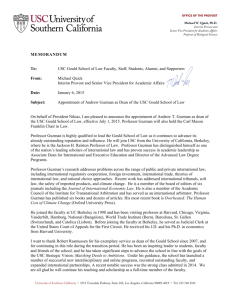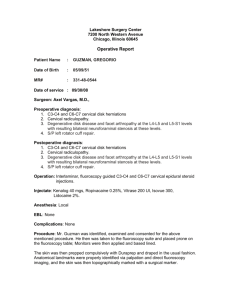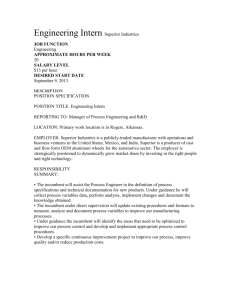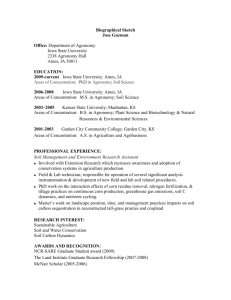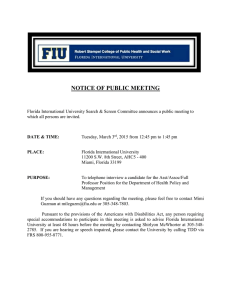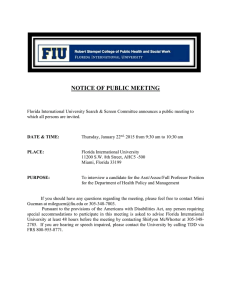Written Statement For a Hearing on
advertisement
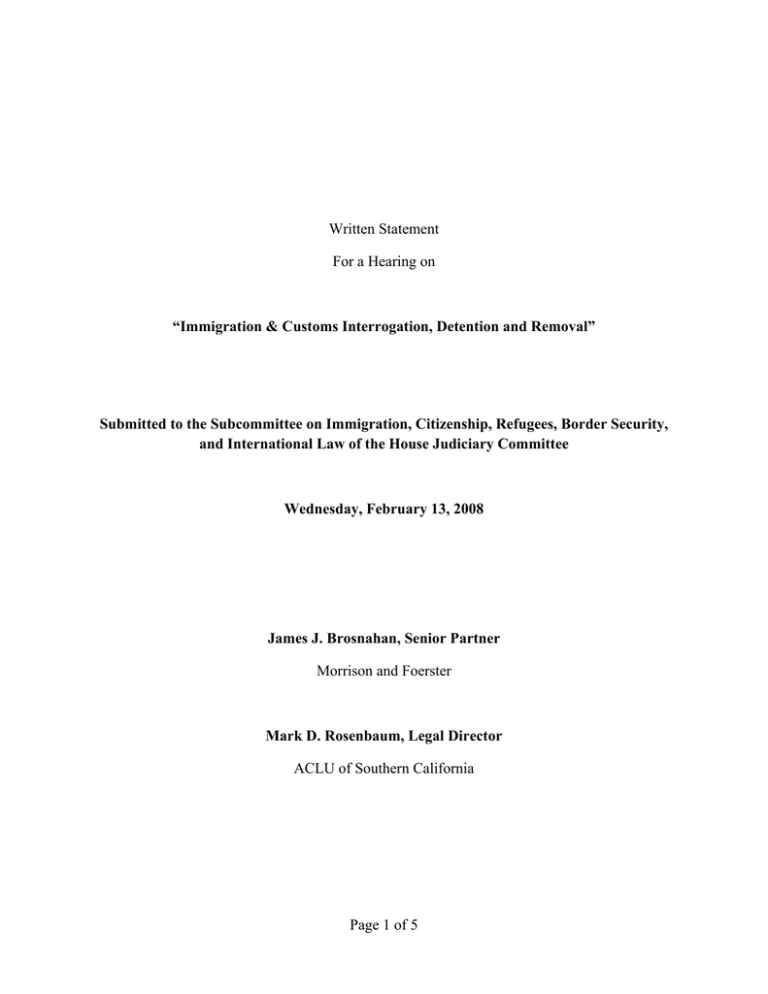
Written Statement For a Hearing on “Immigration & Customs Interrogation, Detention and Removal” Submitted to the Subcommittee on Immigration, Citizenship, Refugees, Border Security, and International Law of the House Judiciary Committee Wednesday, February 13, 2008 James J. Brosnahan, Senior Partner Morrison and Foerster Mark D. Rosenbaum, Legal Director ACLU of Southern California Page 1 of 5 Testimony of James J. Brosnahan and Mark D. Rosenbaum Counsel for Peter Guzman The government—whether it be federal or local—lacks any discretion to deport citizens of the Unites States. Citizenship is the constitutional birthright of every individual born within our national borders, and surely the first obligation of government is to preserve at any cost the liberty and security of its citizens to remain within their homeland. On May 11, 2007, immigration officials and agents of the Los Angeles District of the United States Immigration and Customs Enforcement (“ICE”) Division, under the Department of Homeland Security, in concert with officials of the Los Angeles County Sheriff’s Department, unlawfully deported Peter Guzman, a 30 year-old United States Citizen born and raised in Los Angeles County, to Tijuana, Mexico, a city with which he was utterly unfamiliar, having been there only once, at the age of 14, on a brief trip with his mother. Peter Guzman knew no one in Mexico and had not been there for over a decade. At the time of his deportation, Mr. Guzman had no resources by which he could purchase food or shelter, and only the clothes he was wearing when ICE officials placed him on the bus to Tijuana. His family in nearby Lancaster, California was not notified of his deportation, although officers of the Sheriff’s Department had within just weeks prior to the deportation contacted his brothers on a number of occasions to discuss arrangements for his imminent release from the County Jail system. Mr. Guzman did not have a cell phone or other means to contact his family to bring him back from Mexico. As result of his illegal deportation, Mr. Guzman spent nearly three months wandering on foot in Mexico between Tijuana and Calexico. He frequently ate out of garbage cans and for the most part slept outside without adequate shelter or warmth, bathing in rivers. Mr. Guzman lived in constant fear. That he survived is a matter only of his will to live and fortuity. His suffering from this nightmarish ordeal continues to this day. Mr. Guzman is cognitively impaired and is unable to read at more than a second grade level. At the time of the deportation, he was under the care and supervision of his mother. He is unable to remember his home telephone number or that of anyone else in his life. The illegal deportation of Peter Guzman was not an innocent mistake by ICE officials or agents, but rather the predictable consequence of policies, practices and procedures which rely upon racial and ethnic stereotypes to presuppose undocumented status and lack even rudimentary safeguards against erroneous determinations. Mr. Guzman told personnel processing him for deportation that he was a United States citizen, and Los Angeles County Sheriff’s Department records, compiled at the time of his arrest and booking, and from an earlier incarceration, and readily available to ICE, confirmed his assertion. ICE processed Mr. Guzman for voluntary departure, although official law enforcement records also available to ICE made clear that he would not have been eligible whether or not he had been illegally present within the United States. In addition, medical records of treatment of Mr. Guzman while incarcerated at the Men’s Page 2 of 5 Central Jail ought to have immediately alerted ICE personnel that Mr. Guzman should not have been subjected to administrative processing without at minimum the presence of family members or counsel. These records unquestionably demonstrated that Mr. Guzman was not capable of exercising a voluntary, knowing and intelligent waiver of his rights at the time of his deportation, or, indeed, at any time thereafter. The circumstances that resulted in Mr. Guzman’s illegal deportation originated in a January 25, 2005 Memorandum of Understanding (“MOU”) between the Department of Homeland Security and the Los Angeles County Board of Supervisors creating a pilot project by which Sheriff’s Department personnel interview and process presumed or suspected foreign-born inmates confined within the Los Angeles County jail system to determine the inmates’ immigration status and whether, in their judgment, the inmates are deportable. The personnel within the Sheriff’s Department assigned this responsibility are not deputies, but are described as custody assistants (“CA’s”). These CA’s have received only brief training by ICE, are not versed in immigration law and yet pursuant to the MOU, have been granted federal authority to obtain consents to voluntary departures and to make referrals to ICE for deportations. For all intents and purposes, ICE exercises no meaningful supervision or monitoring of immigration processing by local CA’s within Los Angeles County. BACKGROUND Peter Guzman was born on September 25, 1977 in Los Angeles, California. He is the second of seven children. Mr. Guzman grew up in Lancaster, California. He attended elementary, middle and high schools in Lancaster. On March 31, 2007, Mr. Guzman was arrested for the misdemeanor offense of Trespassing upon Land Under Cultivation in violation of California Penal Code§ 602. He pled guilty to misdemeanor vandalism and was sentenced on April 19, 2007. The judge suspended imposition of the sentence and placed Mr. Guzman on three years probation with a condition that he serve 120 days in County Jail, of which he received credit for 30 days of combined good time and time served. Some time after his sentencing, Mr. Guzman was transferred to the Men’s Central Jail in downtown Los Angeles and was processed thereto at the Inmate Reception Center. In response to a question relating to his citizenship, he stated that he was born in California. Department personnel recorded his response in official records relating to his arrest and detention. During the course of the next weeks, Sheriff’s Department personnel contacted Mr. Guzman’s family on at least two occasions, at one point seeking to verify information for purposes of arranging an early release to his residence. At no point did these personnel or ICE agents question whether Mr. Guzman was a United States citizen or attempt to verify citizenship. Page 3 of 5 Other law enforcement records available also recorded that Mr. Guzman was a United States citizen. By reason of an earlier conviction and incarceration, there ought to have existed serious question as to whether Mr. Guzman would have been eligible for voluntary departure even if he had been illegally within the United States. County medical records relating to Mr. Guzman disclose that on April 7, 2007, just one week after his arrest, he was prescribed 5mg of Zyprexa to be taken daily. Their documents state: He has been in jail for more than one week. He was at LCMC for AMS and he is sent back with Zyprexa 5mg daily for voices. He told the ER doctor at LCMC that he hears voices of and on, telling him ‘bad things’ but there is no other specifics of ‘voices’ documented or asked. Further voices increased when he came to jail. DEPORTATION AND DISAPPEARANCE On or about May 10, 2007, a Custody Assistant processed Mr. Guzman and obtained a signature waiving his legal rights and agreeing to be voluntarily deported to Mexico. ICE personnel did not undertake any reasonable inquiry into the circumstances of the processing or as to why Mr. Guzman was then questioned about citizenship. Nor did ICE inquire as to Mr. Guzman’s eligibility for voluntary departure or as to why law enforcement records consistently stated that he had been born in California. As result, Mr. Guzman was placed on a bus to Tijuana and illegally deported to Mexico. On May 11, 2007, Mr. Guzman, utilizing a borrowed cell phone and a slip of paper with his brother’s telephone number, called the residence of his brother and spoke to his sister-in-law, Victoria Chabes. The call lasted no more than a minute and the slip of paper was lost shortly thereafter. Mr. Guzman stated that he had been placed on a bus at the jail and that he did not have money or clothes with him. Ms. Chabes called at once Mr. Guzman’s mother, Maria Carbajal, and relayed the conversation. Fearing for her son’s safety and well being, Ms. Carbajal returned to her home, obtained Mr. Guzman’s birth certificate and drove with one of her sons to Tijuana to begin to search for him. Over the next three months, Ms. Carbajal, Mr. Guzman’s brothers, his sister-in-law, and other family members searched in Tijuana and adjoining cities for Mr. Guzman. Ms. Carbajal often walked through the city. She and family members regularly searched morgues, hospitals, jails, shelters and along rivers and alleys. Ms. Carbajal arranged to temporarily leave her job as a cook at Jack in the Box to devote virtually all of her time to the efforts to find her son. Because the family had very limited resources, Ms. Carbajal stayed at times in a room no larger than a closet in a banana warehouse where she slept on the floor. She cooked in exchange for the room. Page 4 of 5 A usual day would begin at 6:00 a.m. and not finish until late at night. Ms. Carbajal and family members circulated hundreds of flyers with a picture of Mr. Guzman and information about him. Mr. Guzman wandered on foot over hundreds of miles for eighty-nine days between Tijuana and Calexico. He physically survived by begging and picking food from garbage. He bathed in the Tijuana River and typically slept outside. Until a habeas action was filed in federal court, and worldwide attention was brought to the case, the United States government offered no assistance to Ms. Carbajal and her family despite repeated pleas for help. When prior to the filing of the habeas, counsel for the family informed a Los Angeles ICE official of the circumstances of the deportation, and faxed a copy of the birth certificate, the official stated that upon proof of the validity of the certificate, ICE would amend its records to correctly reflect Mr. Guzman’s United States citizenship, but would take no additional steps to find and return him to the United States. Upon his return to the United States, Mr. Guzman was unable to speak and physically incapable of stopping from shivering. He is currently receiving psychological treatment as result of the illegal deportation. Ms. Carbajal stated shortly after his return that “he left complete but they took half my son.” Page 5 of 5

